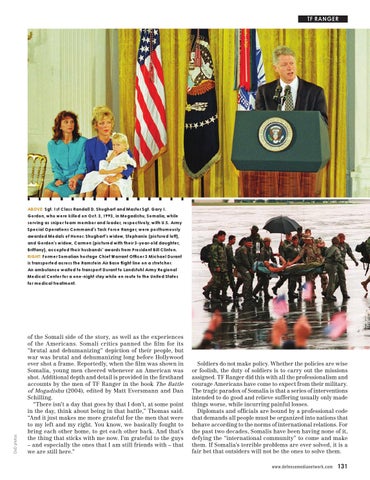TF RANGER
ABOVE: Sgt. 1st Class Randall D. Shughart and Master Sgt. Gary I. Gordon, who were killed on Oct. 3, 1993, in Mogadishu, Somalia, while serving as sniper team member and leader, respectively, with U.S. Army Special Operations Command’s Task Force Ranger, were posthumously awarded Medals of Honor. Shughart’s widow, Stephanie (pictured left), and Gordon’s widow, Carmen (pictured with their 3-year-old daughter, Brittany), accepted their husbands’ awards from President Bill Clinton. RIGHT: Former Somalian hostage Chief Warrant Officer 3 Michael Durant is transported across the Ramstein Air Base flight line on a stretcher. An ambulance waited to transport Durant to Landstuhl Army Regional Medical Center for a one-night stay while en route to the United States
DoD photos
for medical treatment.
of the Somali side of the story, as well as the experiences of the Americans. Somali critics panned the film for its “brutal and dehumanizing” depiction of their people, but war was brutal and dehumanizing long before Hollywood ever shot a frame. Reportedly, when the film was shown in Somalia, young men cheered whenever an American was shot. Additional depth and detail is provided in the firsthand accounts by the men of TF Ranger in the book The Battle of Mogadishu (2004), edited by Matt Eversmann and Dan Schilling. “There isn’t a day that goes by that I don’t, at some point in the day, think about being in that battle,” Thomas said. “And it just makes me more grateful for the men that were to my left and my right. You know, we basically fought to bring each other home, to get each other back. And that’s the thing that sticks with me now. I’m grateful to the guys – and especially the ones that I am still friends with – that we are still here.”
Soldiers do not make policy. Whether the policies are wise or foolish, the duty of soldiers is to carry out the missions assigned. TF Ranger did this with all the professionalism and courage Americans have come to expect from their military. The tragic paradox of Somalia is that a series of interventions intended to do good and relieve suffering usually only made things worse, while incurring painful losses. Diplomats and officials are bound by a professional code that demands all people must be organized into nations that behave according to the norms of international relations. For the past two decades, Somalis have been having none of it, defying the “international community” to come and make them. If Somalia’s terrible problems are ever solved, it is a fair bet that outsiders will not be the ones to solve them. www.defensemedianetwork.com
131
